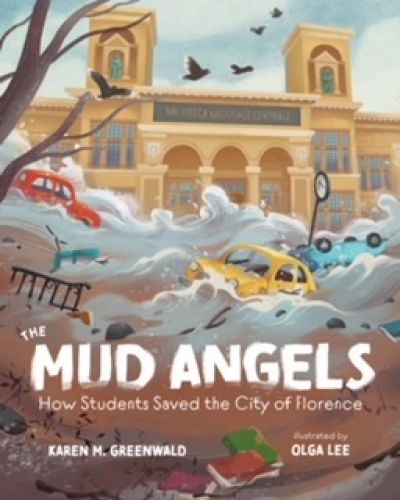After enormous waves crash into buildings, museums, and other structures in Florence, they leave behind thousands of tons of smelly, viscous, oil-filled mud. Everywhere. Covering everything. A young narrator watches students from the U.S., Italy, and other countries courageously trek through dangerous filth to save Florence’s rarest antiquities at the Biblioteca Nazionale Centrale di Firenze (BNCF). It is a race against time (and mud) and the harsh journey is nowhere near as challenging as what awaits them.
“The Mud Angels: How Students Saved the City of Florence” (Albert Whitman 4.4.24) is the first children's book in English about the shocking 1966 Arno flood and its surprising international and Italian young heroes. From braving toxic, debris-filled mud to overcoming communication barriers, these "Mud Angels" (as they were dubbed) proved that young people can change the world. Why did they risk so much? As one of the Mud Angels I interviewed explained, “Once in the mud, we were all Italian!”
Recently, La Gazzetta Italiana had the opportunity to chat with author Karen M. Greenwald about her latest book.
La Gazzetta Italiana (LG): What did you enjoy most about writing this book?
Karen Greenwald (KG): There were so many things that I enjoyed about writing this book! I've always had a love of both art and history. Digging through pieces of the past to uncover compelling stories is exciting. It makes me feel like a history detective. But nothing inspires me more than primary information. I interviewed 16 of the original Mud Angels. They were foreign students who lived through the flood and were among the first wave of helpers to volunteer. Each of these fascinating conversations transported me to Florence circa 1966. From the dress codes of the day (where female students couldn't wear pants) to learning about favorite gelato shops, and first views of the David, their adventures prior to the flood sounded dreamlike. What a contrast to how life changed in the early hours of that shocking and dangerous November morning.
I learned firsthand about what it was like being submerged waist-deep in the library's watery, oily, mud-filled basement. There, abroad students, strangers from around the world, worked together searching for 16th and 17th century books and forming a bucket brigade. I cannot imagine the stench that surrounded them (and I’m happy that I've never smelled it!), but I know it was powerful enough to be a main topic. Overcoming all these unpleasant and challenging hurdles to save documents, literature, and the like underscores the reverence felt for Italian heritage and culture.
LG: What else would LGI readers be interested in hearing about this book?
KG: I think there is an almost endless amount that readers would find fascinating. I will limit myself to a few powerful examples. First, study-abroad students living in Florence who volunteered (without being asked) in the initial hours did so without the use of protective gear, like gloves, masks, coveralls, or boots. Yet, many of those I interviewed recalled feeling "lucky" that they were there and could help. The impromptu international community navigated physical, odorous, lingual, and cultural barriers. When I asked one of the American Mud Angels about how she communicated with those with whom she did not share a common language, she said, “Once in the mud, we were all Italian!”
After 18 perilous hours, centuries of Italian treasures, puzzle-pieces of cultural history, were nearing destruction. Enormous mistakes made initially with recovery efforts worsened the situation. Thankfully, a British conservationist named Peter Waters came to Florence and created a nine-phase conservation plan – the first universal plan for museums, archives, libraries, et al. Like the diversity of the Mud Angels, the experts Mr. Waters worked with hailed from many different countries.
Finally, I recently had the incredible opportunity to watch a third grade class get introduced to my book and the history of the flood. The guest reader sat next to an unsuspecting student who, at the story’s end, learned that her grandma had been one of the original Mud Angels (one of those I interviewed). Words cannot express how it felt watching her find out that her grandmother is a hero! I teared up when she hugged the book! Then, the guest reader asked what inspiration students could take from the story. One child said, “They were teenagers and that proves that kids and teenagers can change the world!” Hearing that made the three years of work put into this book more than worthwhile!
“The Mud Angels: How Students Saved the City of Florence” is available on Amazon, at I AM Books (an Italian bookstore in Boston), and wherever books are sold.
Karen M. Greenwald is an award-winning children’s author. Her book, “A Vote For Susanna, The First Woman Mayor” (Albert Whitman), was named a Kansas Notable Book in 2022. Kansas chose it to represent their state at the Library of Congress National Book Festival and in the Library of Congress’ Great Reads from Great Places initiative. “The Mud Angels: How Students Saved the City of Florence” (Albert Whitman) launched in April 2024. Booklist, the American Library Association's review publication, praised Greenwald's "vivid descriptions," calling “The Mud Angels”, "A true episode worth commemorating." She co-founded the #SunWriteFun writing contest, which raises money (or book donations) for under-resourced school and public libraries. Professionally, Greenwald's strategic branding efforts have earned seventeen international awards, including a 2023 Platinum MEA. She is a Phi Beta Kappa graduate of Georgetown University and holds her JD from Georgetown University Law Center.
Photos by Joe Blaustein.
https://www.lagazzettaitaliana.com/history-culture/10441-the-mud-angels-how-students-saved-the-city-of-florence#sigProIdc8bcf2a872




